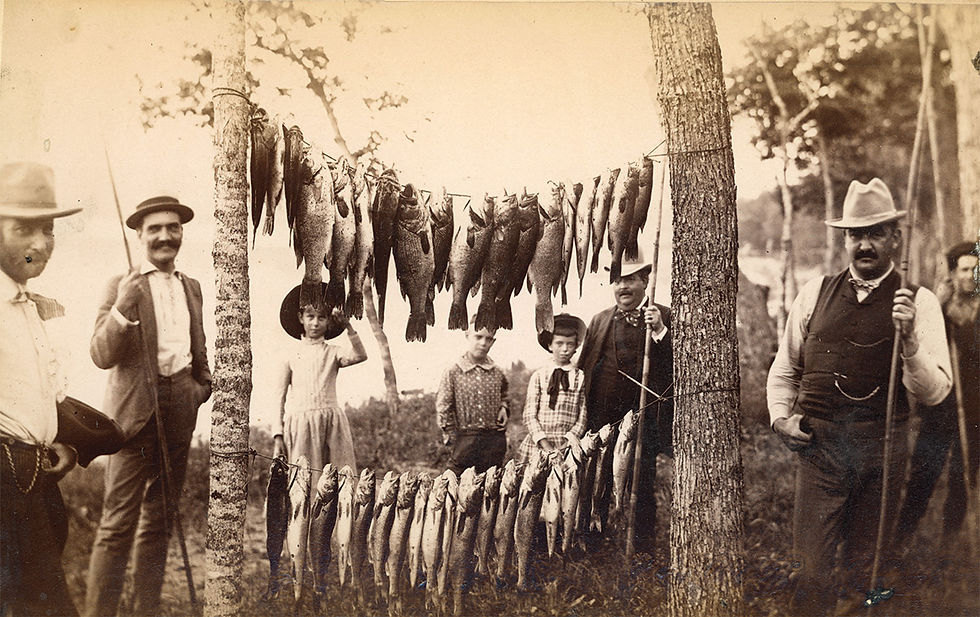Message in a postcard
- Sr Perspective

- Oct 1, 2019
- 3 min read
A look at the other side of postcards

Postcard collectors are usually most interested in the front of the card but messages can be fun, too. Photo by Dan Hovland
A picture is worth a thousand words but words count, too! Early 1900s postcards were the text messages of that time. Most deltiologists (postcard collectors) focus on the front of the card, but joy can be found in studying the messages on the back, too.
As you will see in many of the messages in this article, spellcheck was not available at the time and punctuation was optional.
Everyone looked forward to seeing what the mailman had to deliver and this postcard shows a man’s frustration with his mother’s lack of writing:
“Have you run out of writing paper or broke your arm. Hope no such ill luck as that. Better write.”
Messages may be very simple as a 1910 birthday card demonstrates: “Best Wishes from Mamma.”
Postcards have always been a popular travel souvenir. A 1963 card showing South Dakota’s Crazy Horse simply said, “Good trip. One flat tire in Yellowstone.”

A lipstick kiss on this card sent to Howard has the note “Wilma’s kiss for you” but someone crossed off “for you” and wrote “period”! Photo by Dan Hovland
You can hear a definite accent in this typed message from 1938: “Dear Broder: Please see vat the price on Vodka wholesale Kokolavitch vants you to see if you can get some beg size pents for his boy. Ven de boat comes in from Cleveland look for Abe Goldenberg”
Postcards helped spread the word of a new birth:
“Tell Uncle excouse me for not righting sooner but as I must say the stork brought me a little baby boy.”
Or announce a death:
“Claret’s mother was accidentally shot here at this lake while working here. She was 57 years old. We all feel terrible. Funeral is being held today at 2 PM.”
Or announce an exciting change in communication:
“Dear cousin, We have the tellephone Boxes up and I have talked to everbody that have fones. Yous want to call us up. our ring is to long and to short.”
This note may have been written simply in jest:

World War II military personnel were able to send mail for free, often on special postcards like this one from Oregon. Photo by Dan Hovland
“Heard you nearly lost your job cause you didn’t get home in time to milk the cows the morning after the night before.”
This card (written with very little punctuation) came from Hanska, Alberta and was obviously written in the winter:
“Hello Froggy. how are you I am on the claim getting old and stiff from sitting around so much was down to the old folks today got my nose and cheeks froze cold here this winter from 30 to 50 below every day.”
This 1911 gem must have created some laughs:
“You better come down to the farm pretty soon every body lives high, even the cow ate 48 loaves of bread & 50 cents worth of doughnuts for supper the other night.”
Here is a bit of a tease from Mary Ann to Alden:
“How come you’re so bashful (look whose talking). The next time you see me remember I don’t bite.”
The Spa in Excelsior Springs, Missouri must have been an expensive place to visit in 1949:
“Dear Folks, This is a great place to be relieved of nearly every thing, especially money!”
This Girl Scout must have been given an exaggerated account of life at camp:
“Hi. How are you Betsy is sick. First she was home sick. We do not have fried chicken and steak. XX XX XX XX Love, Judy”

A message written in spiral form asks the reader, “How do you like this kind of a card? Are you getting dizzy?” Photo by Dan Hovland
Real photo postcards often gave the receiver a wonderful image of another person’s life; messages like this added to the image:
“This is a picture of Herschell in Canada. he has no other companion but doggie.”
Here is a college coed with something to brag about:
“I have already gone out with a guy from Colgate, and a guy from Yale, and I’ve only been here a day.”
On the other hand, this 1911 message has some strict advice for a university student:
“If my church duties do not occupy all my time tomorrow I shall endeavor to dispatch to you another Epistle. Meanwhile, strive to correct the error of your ways. Restitute of conduct is a virtue not to be ignored. Do you follow me?”
Letter writing, or even scribbling a quick note on a postcard seems to be becoming a lost art. Let’s keep the tradition going or you may get a scolding like this 1901 message:
“Dear Friend, What is the matter with you? Are you dead or alive. We would like to hear from you.”




Comments